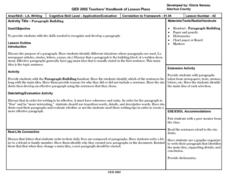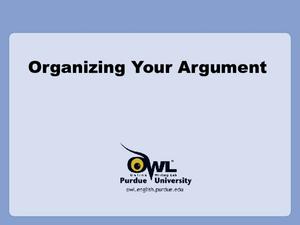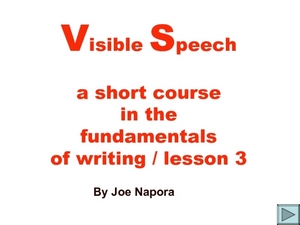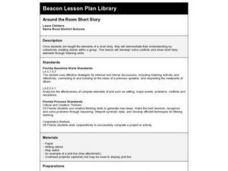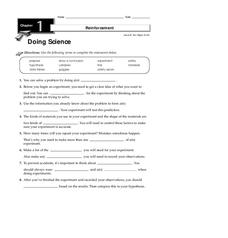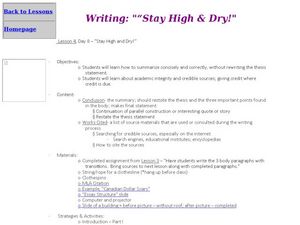Curated OER
When A Story Met A Sandwich
How is a story like a peanut butter and jelly sandwich? Use making a sandwich as a metaphor to remind your writers that a good, solid beginning, a rich and rewarding middle, and an ending that brings everything together spices up a...
Curated OER
Animation Pre-Production
Does your class love reading cartoons? Use their talents and interests to examine the process of writing a story they wish to tell through a cartoon. They develop the beginning, middle, and end of a story based on their original...
Curated OER
Paragraph Building
Build the skills your budding authors need to develop to compose well-structured paragraphs. Give them the topic sheet (included here), and have them write a cohesive paragraph using the ideas listed. Consider having them include two...
Curated OER
Organizing Your Argument
Constructing a well-organized argument is the focus of this tutorial, originally created for the Purdue University writing program. The slides can be adapted for any composition course or writing unit.
Curated OER
Essay Writing
Are your learners working towards their GED? First they study the GED essay rubric, and then they read a sample essay as a group. After studying the basic elements, they write an essay of their own. After peer editing, they revise their...
Curated OER
The Personal Narrative - Part Two
Does your langauge arts class journal frequently? Extend one of your journaling activities by having your writers choose a journal entry and take it through the five stages of writing. They will use the attached graphic organizer to...
Curated OER
How to Write A+ Essays!
This lesson, which promises to improve the essays of your middle schoolers, contains a list of characteristics an essay should include. It breaks it down into the introduction, thesis statement, body, etc. There's also a list of things...
Curated OER
Five Paragraph Essay
The components of a five-paragraph essay are outlined on these slides. Not much explanation is given, but you can use this as you lecture and help your learners write. Follow the outline for what each paragraph should contain, and...
Curated OER
Visible Speech: A Short Course in the Fundamentals of Writing/Lesson 3
Focusing on writing an introduction, this presentation provides a variety of techniques for how to begin. Although the question marks on slide six obscure the writing, the other slides are clear and legible and display good examples for...
Curated OER
Visible Speech: A Short Course in the Fundamentals of Writing (Lesson 5)
Of these five slides, two consist of the title and directions; the other three list the parts of an essay and their purpose, as well as how to best begin an essay. In essence, this is a very brief PowerPoint that can be used as a...
Curated OER
Around the Room Short Story
Collective story writing is a great way to reinforce the concept of story elements and collaborative learning. Young writers discuss story elements such as, setting, character, action, climax, conclusion, foreshadowing, dialogue, and...
Curated OER
In Conclusion
Guide students on what reading comprehension and drawing conclusions really are. After discussing what they have learned and concluded from a short story, students read another story and work together to understand story details, and...
Curated OER
Experiment Report
In this experimental design activity, learners fill out their title, hypothesis, independent and dependent variables, data table, graph and conclusion for their lab.
Curated OER
Freshman Project-Part 5
In this project instructional activity, 9th graders display their data, the make a graph and they answer analysis and conclusion questions on their experimental design project. They discuss the variables of their experiment, their major...
Curated OER
Write Your Science Research Paper!
In this research paper instructional activity, students fill in an outline of their research project. Included is the title of the project, their hypothesis, an introduction paragraph that they analyze as well four supporting paragraphs...
Curated OER
Doing Science
In this science experiment process worksheet, students will learn about the steps of conducting a science experiment, including creating a hypothesis, collecting data and drawing a conclusion. This worksheet has 8 fill in the blank...
Curated OER
Easy Worksheet: Hypothesis and Conclusion 2
In this hypothesis and conclusion worksheet, students solve 6 short answer problems. Students identify the hypothesis and conclusion of a given if-then statement.
Curated OER
Easy Worksheet: Hypothesis and Conclusion 3
In this hypothesis and conclusion worksheet, students solve 6 short answer problems. Students identify the hypothesis or conclusion of a given if-then statement.
Curated OER
Easy Worksheet: Hypothesis and Conclusion
In this hypothesis and conclusion worksheet, learners solve 6 short answer problems. Students write the hypothesis or conclusion given an if-then statement.
Curated OER
Write the Hypothesis and Write the Conclusion Problems
In this logic worksheet, students write the hypothesis for the given statement in two problems and the conclusion in the other two problems. The solutions are not provided.
Curated OER
Writing: Stay High and Dry
Students write an effective conclusion for their essay. In this conclusion lesson plan students restate the thesis of their paper and summarize three important points. Students then write a final statement to wrap up their thoughts. ...
Curated OER
Beginning and End
Are you working onevent sequence in your kindergarten class? Use a reading activity to have your kids discuss events from the story, and put them in order. They then cut and paste them in the correct order. A great project for any story!
Curated OER
Being Flexible
In this flexibility worksheet, students read a paragraph about a soda can that exploded in a car. They choose from a list of options the possibilities for the can exploding. They practice using flexible thinking skills.
Curated OER
Conditional Statements
In this conditional statements review worksheet, students answer 5 multiple choice questions that involve identifying the conclusion, hypothesis, and the different types of conditional statements.




